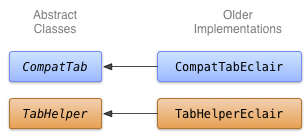使用舊的APIs實現新API的效果
編寫: spencer198711 - 原文:http://developer.android.com/training/backward-compatible-ui/older-implementation.html
這一課討論瞭如何創建一個支持舊的設備並且與新的APIs接口相同的實現。
決定一個替代方案
在以向後兼容的方式使用較新的UI功能的時候,最具挑戰的任務是為舊的平臺版本決定一個解決方案。在很多情況下,使用舊的UI框架中的功能是有可能完成這些新的UI組件的。例如:
- Action Bar可以使用水平的包含圖片按鈕的LinearLayout來實現,這個在Activity中的LinearLayout作為自定義標題欄或者僅僅作為視圖。下拉功能行為可以使用設備的菜單按鈕來實現。
- Action Bar的tab頁可以使用包含按鈕的水平的LinearLayout,或者使用TabWidgetUI控件來實現。
- NumberPicker和Switch控件可以分別通過使用Spinner和ToggleButton控件來實現。
- ListPopupWindow和PopupMenu控件可以通過使用PopupWindow來實現。
為了往老的設備上向後移植UI組件,這些一般不是一刀切的解決方案。注意用戶體驗:在老的設備上,用戶可能不熟悉新的界面設計模式和UI組件,思考一下如何使用熟悉的控件去實現相同的功能。在很多種情況下,這些通常不會被注意到,特別是在如果新的UI組件在應用程序的生態系統中是突出的(比如Action Bar),或者交互模型是非常簡單和直觀的(比如使用ViewPager去滑動界面)。
使用舊的APIs實現Tabs
你可以使用TabWidget和TabHost(儘管其中一個也可以使用水平方向的Button控件)去創建Action Bar Tabs的老的實現。可以在TabHelperEclair和CompatTabEclair的類中去實現,因為這些實現使用了不遲於Android 2.0(Eclair)的APIs。
- 圖1. Eclair版本上實現tabs的類圖
CompatTabEclair在實例變量中保存了諸如tab文本和tab圖標等tab屬性,因為在老的版本中沒有ActionBar.Tab對象去處理這些數據存儲。
public class CompatTabEclair extends CompatTab {
// Store these properties in the instance,
// as there is no ActionBar.Tab object.
private CharSequence mText;
...
public CompatTab setText(int resId) {
// Our older implementation simply stores this
// information in the object instance.
mText = mActivity.getResources().getText(resId);
return this;
}
...
// Do the same for other properties (icon, callback, etc.)
}
TabHelperEclair利用了TabHost控件的方法去創建TabHost.TabSpec對象和tab的頁面指示效果:
public class TabHelperEclair extends TabHelper {
private TabHost mTabHost;
...
protected void setUp() {
if (mTabHost == null) {
// Our activity layout for pre-Honeycomb devices
// must contain a TabHost.
mTabHost = (TabHost) mActivity.findViewById(
android.R.id.tabhost);
mTabHost.setup();
}
}
public void addTab(CompatTab tab) {
...
TabSpec spec = mTabHost
.newTabSpec(tag)
.setIndicator(tab.getText()); // And optional icon
...
mTabHost.addTab(spec);
}
// The other important method, newTab() is part of
// the base implementation.
}
現在你已經有了兩種CompatTab和TabHelper的實現,一種是使用了新的APIs為了能夠在Android 3.0或其後版本設備上能夠運行,另一種則是使用了舊的APIs為了在Android 2.0或之前的設備上能夠運行。下一課討論在應用中使用這兩種實現。
